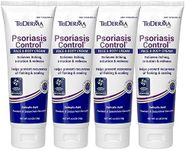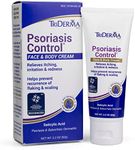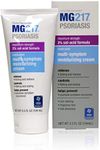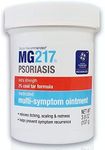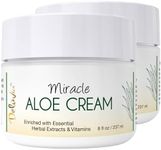Buying Guide for the Best Psoriasis Creams
Choosing the right psoriasis cream can be a crucial step in managing and alleviating the symptoms of psoriasis. Psoriasis is a chronic skin condition that causes cells to build up rapidly on the skin's surface, leading to scaling, inflammation, and redness. The right cream can help reduce these symptoms, improve skin appearance, and provide relief from itching and discomfort. When selecting a psoriasis cream, it's important to consider several key specifications to ensure you find the best fit for your needs.Active IngredientsActive ingredients are the components in the cream that directly address psoriasis symptoms. Common active ingredients include corticosteroids, salicylic acid, coal tar, and vitamin D analogues. Corticosteroids reduce inflammation and itching, making them suitable for moderate to severe psoriasis. Salicylic acid helps to remove scales and smooth the skin, ideal for mild to moderate cases. Coal tar reduces scaling, itching, and inflammation, and is often used for chronic psoriasis. Vitamin D analogues slow down skin cell growth and are effective for mild to moderate psoriasis. Choose a cream with active ingredients that match the severity and specific symptoms of your psoriasis.
Moisturizing PropertiesMoisturizing properties are essential in a psoriasis cream as they help to keep the skin hydrated and prevent dryness, which can exacerbate symptoms. Look for creams that contain ingredients like glycerin, hyaluronic acid, or natural oils such as coconut or jojoba oil. These ingredients help to lock in moisture and create a protective barrier on the skin. If you have very dry skin, opt for a cream with high moisturizing properties. For less severe dryness, a lighter moisturizer may suffice.
Formulation TypeThe formulation type refers to the consistency and texture of the cream, which can affect its application and absorption. Common formulations include ointments, creams, lotions, and gels. Ointments are thick and greasy, providing a strong barrier and are best for very dry or thickened skin. Creams are less greasy and suitable for most skin types, offering a balance between moisture and absorption. Lotions are lighter and more easily absorbed, ideal for less severe cases or for use on larger body areas. Gels are non-greasy and quickly absorbed, making them suitable for hairy areas or the scalp. Choose a formulation that feels comfortable on your skin and fits your lifestyle.
Fragrance-FreeFragrance-free creams are important for individuals with sensitive skin or allergies, as fragrances can cause irritation or allergic reactions. Psoriasis-affected skin is often more sensitive, so it's best to avoid creams with added fragrances. Look for products labeled as 'fragrance-free' or 'unscented' to minimize the risk of irritation. If you have a history of skin sensitivities or allergies, opting for a fragrance-free cream is a safer choice.
Ease of ApplicationEase of application refers to how easily the cream can be applied and spread over the affected areas. This can be influenced by the cream's texture, packaging, and whether it leaves a residue. Creams that come in tubes or pumps are generally easier to apply and more hygienic than those in jars. Consider how often you need to apply the cream and whether you need to cover large or hard-to-reach areas. A cream that spreads easily and absorbs quickly can make the application process more convenient and effective.
Dermatologist RecommendationsDermatologist recommendations can provide assurance that the cream has been tested and approved by skin care professionals. Products that are dermatologist-recommended are often formulated with ingredients that are effective and safe for treating psoriasis. Look for creams that have endorsements from dermatologists or reputable medical organizations. If you are unsure, consult with your dermatologist to get personalized recommendations based on your specific condition and skin type.


